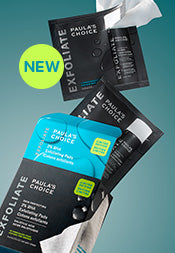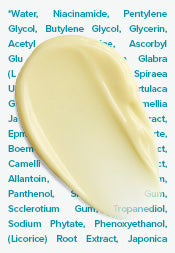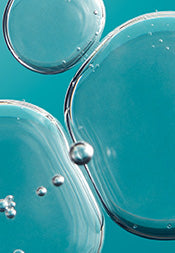How to Manage Dehydrated, Oily, Acne-Prone Skin
Having skin that is dehydrated yet oily and prone to acne all at the same time can be extremely frustrating. Once you understand what’s going on with the underlying triggers, plus which products you need to use (and what to avoid), you can assemble an ideal skincare routine to start seeing impressive results.
What is dehydrated, oily, and acne-prone skin?
This combination of skin problems is recognisable when the surface of the skin is dry or flaky with a layer of oil sitting on top, all accompanied by blemishes.
Does dehydrated skin cause acne?
No, dehydrated skin does not cause acne. What’s more likely going on is that you are using products that aren’t right for your skin type (too emollient or too drying), or products that contain harsh, irritating ingredients. This could be causing your skin to become more oily yet dehydrated at the same time, while also triggering inflammation that makes breakouts worse.
Is dehydrated skin permanent?
Dehydrated skin is typically a temporary condition most often caused by using the wrong skin care products. Changing to the right products usually relieves the problem, or at the very least, will lessen the severity and eliminate a dehydrated, flaky surface.
However, acne and oily skin tend to persist because they are usually inherited disorders, which can further be exacerbated by choosing the wrong products (1).
What causes dehydrated and acne-prone skin?
Unknowingly using irritating products causes skin to be dehydrated, oily, and become more prone to acne all at the same time. Top offenders include:
- Using drying soaps, harsh scrubs, or being too aggressive with cleansing brushes (especially ones with bristles that are stiff and rough on skin)
- Applying toners, astringents, or any product that contain high amounts of alcohol or other irritating ingredients (think witch hazel, menthol, citruses, eucalyptus)
- Using products that contain high amounts of natural or synthetic fragrances, including fragrant essential oils
- Foregoing daily sunscreen use—sun damage plays a significant role in disrupting the surface of skin and can worsen acne (2)
Correcting these skincare mistakes will go a long way toward getting your skin back on the right track.
Choosing Dehydrated, Oily, Acne-Prone Skin Products
How do you then choose the right products for dehydrated, oily, acne-prone skin? Start by addressing the acne issue—numerous studies have shown that salicylic acid (BHA) and benzoyl peroxide are top anti-acne ingredients (3,4,5).
Bear in mind, not all salicylic acid and benzoyl peroxide products are created equal. Some include harsh, irritating ingredients that can actually increase oil production and cause flaky, dry patches at the same time. That’s why it’s so critical that you choose anti-acne products carefully.
Top options for mild to moderate acne:
- CLEAR Regular Strength Anti-Redness Exfoliating Solution 2% BHA
- CLEAR Regular Strength Daily Skin Clearing Treatment 2.5% BP
For more stubborn acne:
- CLEAR Extra Strength Exfoliating Solution 2% BHA
- CLEAR Extra Strength Daily Skin Clearing Treatment 5% BP
Next, focus on the rest of your routine for dehydrated, oily skin…
How do I moisturize my dehydrated skin?
Because of dehydrated skin’s unique needs, you will need to find a moisturizer middle ground that addresses hydration without clogging pores or making skin oilier. Hybrid textures like a lightweight, gel-cream moisturizer tend to work best for dehydrated skin. Steer clear of rich, emollient, creamy products.
For daytime, don’t forget a moisturizer with SPF. Fluid sunscreens are excellent for hydrating and protecting skin in a lightweight layer that doesn’t leave skin feeling greasy or occluded.
Other products for dehydrated, oily, acne-prone skin
Gentle cleansers and liquid toners filled with skin-replenishing ingredients are crucial for dehydrated, oily skin (6). Lightweight serums formulated with skin-restoring ingredients and an array of soothing antioxidants can be beneficial as well.
Here are some options from Paula’s Choice Skincare that will work perfectly for oily, dehydrated, acne-prone skin:
- RESIST Perfectly Balanced Foaming Cleanser
- RESIST Weightless Advanced Repairing Toner
- RESIST Ultra-Light Super Antioxidant Concentrate Serum with Hyaluronic Acid
Targeted treatments with retinol, niacinamide, and vitamin C can also help because each ingredient works to improve a dull, uneven skin tone, minimise pores, and has skin-restoring properties to help your skin get back to looking and feeling normal.
Balancing your anti-acne skincare routine for dehydrated, oily skin
Even the best anti-acne skincare routines can go awry if you get overzealous, so be sure to pay attention to how your skin responds and adjust accordingly. For example, some people may find the combination of salicylic acid and benzoyl peroxide is too much for their skin to handle. In that case, using just one or the other, or alternating daily between the two may be helpful.
It can take some experimenting to see what works best for you, but it’s worth it!
References for this information:
British Journal of Dermatology, 2013, pages 474-485
Journal of Cosmetic Dermatology, May 2020, pages 2,201–2,211
The Cosmetic Ingredient Review, April 2019, pages 1-60
Clinical Therapeutics, March-April 1992, 247-253
American Journal of Clinical Dermatology, 2012, pages 357-64
Journal of Clinical Aesthetic Dermatology, 2013, pages 27-35










